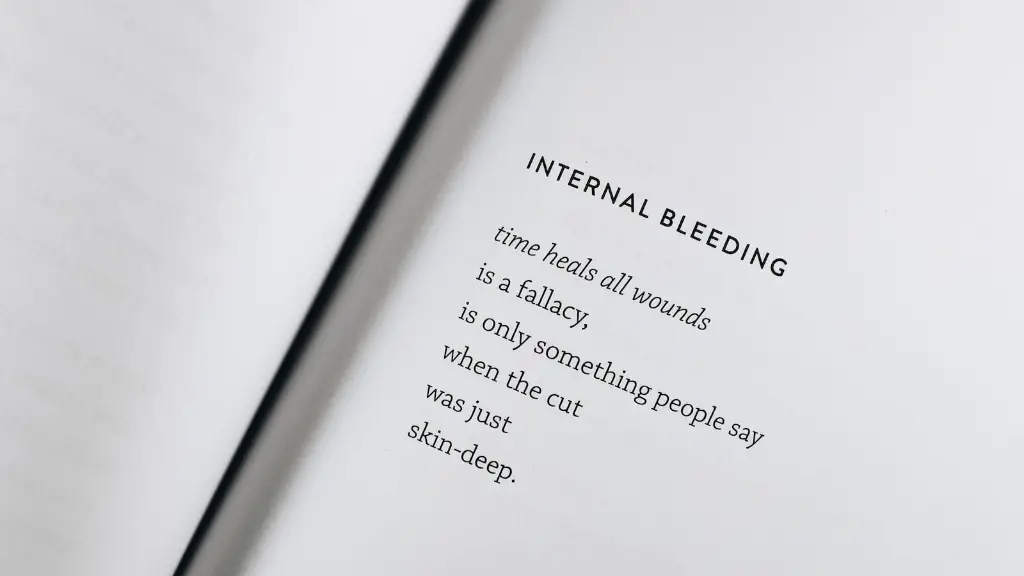Is poetry prose?
As the ancient Greeks established, the distinction between poetry and prose is first and foremost a formal one. Poetry has a particular meter, rhyme, and poetic structure, while prose offers more everyday grammar, syntax, and rhythms. Despite this being well-established, the distinction between poetry and prose remains a contested one; some have argued that any writing can be poetry, and often in more profound ways than might initially be expected.
When we look more closely at the distinction between the two, it appears that there is a significant overlap between them, a kind of overlap that can sometimes confound us into thinking that it is sometimes one and sometimes another regardless of its formal description. In general, what can be considered as an overlap between poetry and prose are stylistic techniques shared by both, such as metaphor, irony, or satire.
Moreover, the form of the two can be blurred due to the fact that both are used to convey ideas and feelings. And while prose is more commonly used to tell a story, there is also a lot of storytelling contained within poetry, too. For example, the lyric poetry of the ancient Greeks featured stories about gods and mythological beings, and the epics combined narrative, storytelling, and poetry. Similarly, much contemporary poetry—from the works of W. B. Yeats to the poetry of contemporary rap artists—involves storytelling and the exploration of human emotions.
The difficulty of ascertaining what is poetry and what is prose is further exacerbated by the fact that some authors are known to mix both forms together. For instance, the writer G. K. Chesterton famously called himself a “poetaster”: he wrote both poetry and prose, often intermingling the two. Stephen Crane, the American author of ‘The Red Badge of Courage’, is another example of a writer who sometimes used both forms. Thus, despite being a formal distinction, we can see that the distinction between poetry and prose is often blurred, and sometimes even ignored.
In the end, what determines whether a given piece of writing is poetry or prose is not only its formal structure, but also its purpose and function within society. In this sense, we can see that both poetry and prose can serve a useful purpose, and that the distinction between the two is far more complex than it first appears.
Historical Context of Poetry and Prose
Poetry and prose have a long history, beginning with the oral tradition in ancient times. Ancient epics and songs, such as Homer’s Odyssey and the Indian Mahabharata and Ramayana, were composed in poetic language, although not in the same set of forms we recognize now. In fact, it was only after the written language was developed that we began to differentiate between what was considered poetry and what was considered prose.
For instance, the evolution of poetic forms can be tracked in the work of ancient Greek writers such as Homer, Herodotus, and Hesiod. The evolution of prose, on the other hand, could be tracked in the work of ancient historians, such as Polybius, Livy, and Plutarch. In more modern times, a similar distinction can be seen in the work of authors such as William Shakespeare, Alexander Pope, and William Wordsworth for poetry, and James Boswell, Daniel Defoe, and Henry Fielding for prose.
Thus, while in theory the distinction between poetry and prose appears to be a formal one, in reality, we can see that it is much more complicated. Not only are certain techniques shared between the two forms, but the purpose and intent of each form are also intertwined. As such, we can see that the distinction between poetry and prose is often a very blurry and contested one.
Significance of Poetry and Prose
Despite their blurry boundary, modern societies continue to value both poetry and prose in different ways. Poetry has a long tradition of being used to orchestrate power and influence over a population, given its capacity to stir emotions, create powerful images, and draw a clear distinction between the writer’s ideas and those of his opponents. Prose, on the other hand, serves more as a tool for conveying information and opinion in a more direct and effective manner.
Furthermore, the distinction between poetry and prose has also been highly influential in terms of literary education standards. Whereas prose is often seen as more “intelligent” and “authentic”, and is thus more valued in educational contexts, poetry has the capacity to speak to both children and adults in a language that is accessible and expressive. In fact, many well-known children’s books are written in poetic form. For example, Dr. Seuss’s books, which use a mix of both formal and informal rhyme schemes and meters, have been read by children for generations.
Thus, when we think about the distinction between poetry and prose, we can see that there is a lot more to it than initially meets the eye. It is a distinction not only of form, but also of purpose and effect; one that informs much of our literary tradition and understanding of the world.
Comparison of Poetry and Prose
When we consider the comparison between poetry and prose, we can see that there are both similarities and differences between the two forms. For example, both poetry and prose utilize metaphors, imagery, and other stylistic techniques to convey ideas and feelings. Both also share a common focus on storytelling, although the techniques on how this is done are quite different between the two. Generally, narrative prose is more direct and explicit in its description of events, characters, and motivations, while poetry is more subtle, utilizing rhyme and imagery to evoke emotion in the reader.
In terms of syntax and grammar, there is also a stark contrast between the two. Prose is usually written in a linear fashion with relatively standard grammar, while poetry is often written with more flexible syntax and more creative grammar structures. The use of rhyme and meter in poetry often gives it a distinct vocal quality, while prose is more subtle in its approach.
Finally, the purpose and intent of the two forms can also differ greatly. Poetry often serves as an opportunity to explore emotions, as well as to create a sensory experience. On the other hand, prose can be used to provide information in a more direct manner, often with the goal of persuading or influencing the reader.
Applications of Poetry and Prose
Given the power of both poetry and prose to evoke emotion, educate, and influence, the two forms are often used for a variety of applications. For one, poetry has often been used as a tool for political empowerment, given its ability to communicate messages in a way that is more poetic and often more impactful. Similarly, many social movements have sought to utilize poetry to communicate their messages and reach a larger audience. Prose, on the other hand, has been used for a variety of educational and persuasive purposes, as it is more direct in its method of communication.
Aside from their use in politics, poetry and prose are both used in many artistic and creative endeavors, such as plays, movies, and television shows. They are often used to provide the framework for an artistic work, setting the tone of the work, introducing ideas, and providing structure to the narrative.
Moreover, poetry and prose are both used extensively in the business world. Poetry can be used to enliven a presentation, while prose is often used to provide in-depth and clear explanations of complex concepts. Both forms also play a role in marketing and advertising, as compelling language can be extremely effective in convincing people to take action.
Implications of Poetry and Prose
The implications of using either poetry or prose are far-reaching, and vary depending on the context and purpose of the work. Poetry, for instance, can carry more emotional weight and evoke a deeper connection between the writer and reader, while prose is often more effective at conveying information in a clear and efficient manner.
Furthermore, it has also been argued that the use of both forms can enhance the reader’s understanding of the material. Studies have suggested that the use of poetic language can sometimes improve comprehension and retention, as readers are more likely to slow down and consider the words more carefully. Prose, on the other hand, can often provide a more straightforward and direct explanation, along with the facts and figures to back up the message.
In the end, then, we can see that the distinction between poetry and prose is much more complex than it first appears. Both forms have their place in the world—poetry for evoking emotion and prose for conveying information—and both have a powerful impact on the people who read them.





